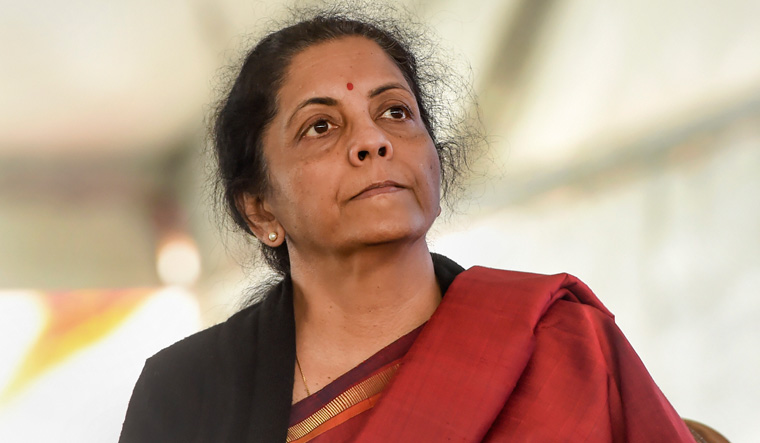From direct cash transfer to bank accounts of the needy to deferred loan and tax repayment, and from an urgent repo rate cut to GST relief, the expectations before the COVID-19 Economic Task Force are big and desperate.
Indian economy growth engine, which was already on the slow track for more than a year now, threatens to get derailed altogether following the coronavirus pandemic and the subsequent plummeting of economic activity. Sectors like travel, hospitality and manufacturing have taken a hit head-on, while the short-to-medium term repercussions for the unorganised sector as well as MSMEs threaten to be deadly.
The COVID-19 Economic Task Force, to be headed by Finance Minister Nirmala Sitharaman, was announced by Prime Minister Narendra Modi in his address to the nation on Thursday night. Promptly, meetings were held by Sitharaman with ministers of civil aviation, tourism, MSMEs, fisheries, animal husbandry and dairying. The meetings were more to assess the impact of the coronavirus on these sectors, as no announcements of any urgent measures were made afterward.
“We had a detailed discussion in the presence of the finance secretary and economic affairs secretary. We are compiling their suggestions," Sitharaman said afterward, saying more meetings will be held in the coming days. “It will be difficult to give a timeline but (announcement of a relief package) will be done as soon as possible.”
Sitharaman may simply not have the luxury of time though, if the graph of patients keep spiking exponentially by the day and even more economic activities come to a standstill. Many states and cities are already in varied stages of lockdown. Sunday’s ‘Janta Curfew’ might just be a pre-cursor to a prolonged period of complete national lockdown and cessation of businesses, as is happening in many parts of the world, especially Europe.
Various industry and trade bodies have called on the government to act, putting forth their suggestions. One of the more prevalent demand is a direct bank transfer of cash to those in dire need, like casual labourers, daily wage workers and the elderly. If implemented, this would test the mettle and efficacy of the Aadhar-based direct benefit transfer method.
In a letter to the prime minister, CII president Vikram Kirloskar called for reworking of GST rules. “GST payments should be on collection of bills than on raising invoices. This will help avoid liquidity getting locked in case there are delays in payment,” he wrote. Kirloskar also called for government to pass pending payments due to industry quickly, as well as removal of long term capital gains tax and fixing dividend distribution tax at 25 per cent.
With manufacturing and retail equally affected, industry bodies have already started clamouring for a repo rate cut as well as a fiscal stimulus. “We urge the finance minister to take necessary incentives to reduce the economic difficulties arising out of coronavirus pandemic which show no sign of abating,” Avneesh Sood, director of the real estate company Eros group told THE WEEK, though he did not specify what exactly Realty wants the government to do.
Another industry body, the ASSOCHAM, has called for a one year moratorium on bank loans and easy credit to small businesses to tide over the crisis. "Seven-year term loans up to three times the net worth of MSMEs (may) be extended to them through NBFCs," it suggested in its note submitted to the finance minister on Saturday. "LIC can chip in with quasi-equity 10-year redeemable or convertible preference shares equivalent to their net worth," it added.
One proposal is to extend the time period in classifying non-performing asset (NPAs). Presently three months, the demand from many business bodies is to make it six months. Similarly, The Confederation of All India Traders has urged the government that in view of the situation, deadline for filing income tax and GST and depositing tax should be extended by three months while the payment of all types of bank loans, EMIs and utility payments should be postponed for next six months, with no interest on the extended period.
As various sectors, organisations and even state governments continues to demand remedial measures, it will be interesting to see how Sitharaman’s task force will weigh on this. Especially considering the government’s weak finances. And if actions speak louder than words, the Central government obtaining a stay from the Supreme Court on the orders of Kerala government as well as Allahabad High Court on Friday to restrain recovery proceedings by tax department and banks due to the outbreak is loud and telling. “Even people who volunteer to pay taxes and file returns will stop doing so,” the government had said, arguing against any temporary halt to loan and tax payments.



